Everything you need to know about RD’s AP course offerings

Page 5
Class of ‘23 Life after RD
Page 6
Page 4

Everything you need to know about RD’s AP course offerings

Page 5
Class of ‘23 Life after RD
Page 6
Page 4
June 2023 Vol. LXVI Issue 3
A look into River Dell’s first senior selfie chain
Page 12
during school so that I could dedicate more time to other areas of my life. This is a skill that I’ll take with me in college and beyond.”
Audrey has dedicated immense time and effort to the school’s community. She is a co-editor-in-chief of The Ridellion and the president of the River Dell HOSAFuture Health Professional chapter and the Spanish National Honor Society. During her high school career, Audrey was inducted into the National Honor Society, English Honor Society, Math Honor Society, Music Honor Society, and Science Honor Society.
Have you ever pictured yourself in the shoes of one of the hardest-working students in school? Can you imagine balancing a strict study schedule while maintaining your social life? Audrey Gang, River Dell’s 2023
valedictorian, epitomizes this lifestyle. Diligent, disciplined, and committed, Audrey Gang embodies what it means to strive for the best.

When asked about her rigorous study schedule, she stated, “Throughout high
school, I challenged myself academically. This year, I’m taking five AP courses. It took some adjusting to find a healthy balance between academics and social life, but by organizing my time efficiently and establish-
ing a routine, I was able to navigate through my various commitments and responsibilities. One of the invaluable habits I learned in high school was how to manage my time more efficiently; I often finished my homework
In addition to being a devoted student, Audrey both embraces and excels at her outside interests. To unwind in her spare time, she enjoys drawing, playing the piano, photography, reading, and traveling. She is also the founder of a performance ensemble that travels to senior centers and libraries throughout northern NJ and has also created a nonprofit tutoring organization for students in the River Dell community. As a talented musician, she has won first place
Continued on page 8
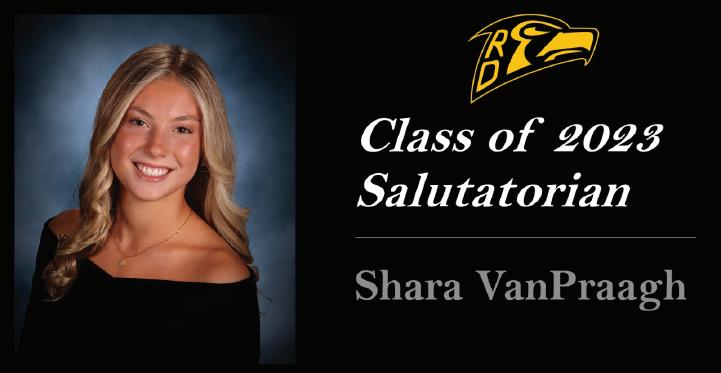 by Noa Kiznerman
by Noa Kiznerman
The Class of 2023 was only in their sophomore year when the world went into lockdown. Though COVID-19 forced sophomores to adjust to social distancing and virtual learning in the middle of their high school careers, many students not only triumphed over this challenge but also came out stronger on the other side of it. Out of the many diligent and enthusiastic students in the class of 2023, one who stands out with her academic accomplishments is Shara VanPraagh, the salutatorian for the Class of 2023. Here, she reflects on how her time at River Dell has helped shape who she is today.
Shara emphasizes the importance of staying up to date with every lesson in the classroom. She shares that her “mentality has always been to stay proactive and never take the easy way out of an assignment because it will always catch up to you in the end. For example, an assignment that is optional or graded on completion may seem pointless to put effort into, as it will not change your grade, but what you learn or improve your understanding of
through doing that assignment can make studying for a related test much easier.
This mindset has helped me avoid cramming for tests because I always stayed on top of my work as we learned the lessons, as opposed to waiting until the night before the test to figure out what I
know and what I don’t.”
Beyond academics, Shara pursues many activities, illustrating her well-rounded, diligent character. She is part of River Dell’s lacrosse and soccer teams, Girl Scouts, a Jewish religious youth group (ETC), and
serves as a tutor for younger students. Shara is also a member of clubs like Best Buddies and Future Teachers Club and coaches for a River Dell youth lacrosse team. She is the president of Mu Alpha Theta and runs a custom art shop on Insta-
gram (@sneakersbyshara), where she mostly paints sneakers. “I like being social and getting involved in different things,” she says, “I like to be creative but also love sports and helping others. I think it’s important to be well-rounded and not only
Continued on page 8
Audrey Gang
Naomi Roth
Editors-in-Chief
Joelle Hwang
Editorials/Opinions Editors
David Arturi
News Editor
Isabella Iturrate
Features Editors
Ben Klein
Sports Editor
Mila Cabanlit
Entertainment Editor
Audrey Gang
Naomi Roth
Copy/Layout Editor
 by Avani Dhariwal
by Avani Dhariwal
River Dell is making some efforts to promote recycling, however, are they sufficient enough to have an impact? After interviewing Mr. Drywa, a science teacher at River Dell, it seems that the school could do even more to help the planet. He suggests River Dell can take even more action to promote recycling and compost. According to Mr. Drywa, “There are limited recycling bins [around the school]. This is because trash, recyclables, paper waste, and compostables are all going into the same bag into the same dumpster.” Ultimately, this prevents recyclables from being recycled and causes contamination. Mr. Drywa recommends setting up separate bins around the school as a simple step in the right direction, but notes that one of the biggest issues with this step lies in the possibility that multiple bins will not be used properly and, “some students would purposely not respect the system as a form of anti-woke culture.” For waste to be properly disposed of, all students must work to respect the planet.
Evelyn Baek
Mila Cabanlit
Danielle Cariaga
Irene Cho
Avani Dhariwal
Jiwon Jeong
Seowon Jeong
Patrick Kelly
Noa Kizhnerman
Angelina Li
Maya Sakai-Chen
Mr. Drywa acknowledges that with separate bins, “the school would need to pay for separate truck pickups. This means possibly more dumpsters to organize the trash and more large fossil fuel-guzzling trucks coming to pick up our waste.” As a solution, he offers that, “having a compostable option would be easy to implement.” He explains how since many students have unfinished lunches, this would be an excellent opportunity to “fertilize the future pollinator garden the Environmental Club wants to plant in the courtyard.”
Nora Yu, the Environmental Club’s president, states that the club is taking actionable steps toward promoting recycling. Last year, they received a grant from Bergen County Utilities to create a garden, a hydroponics system, and a composting system. According to Nora, “Hydroponics was the Maker’s Day project the club pursued last year. It involves a new way of gardening without soil. Through recycling water, gardeners are able to save water and garden in vertical farms.” In other words,
Source: www.marketwatch.com
the club wishes to save water for their plants, which will encourage more plant growth.
For this year’s Maker’s Day, an event held every year at the Oradell Public Library, their project is to inspire others to use recycled paper from used paper scraps. They aim to teach elementary students to think sustainably. Like Mr. Drywa, they believe,
“there are many other recycling initiatives that the school has yet to begin (such as the TREX challenge and Sustainable Jersey), so if anyone has ideas, feel free to join the Environmental Club in room 308 every Friday after school!”
Be sure to join the Environmental Club to help keep River Dell more sustainable, and consider how you can take part in promoting
As of April 28, 2023 the Garden State Plaza has required children 17 and under to be accompanied by an adult age 21 or older after 5:00 pm on Fridays and Saturdays. All supervising adults are required to have valid IDs and to chaperone underaged visitors at all times. Police officers and mall security guards are now responsible for checking IDs and escorting unaccompanied minors to “waiting zones” near the movie theater, the west side entrance, or the food court where they can wait for their parent/ guardian to pick them up. The mandate does not include the mall’s AMC theater or restaurants, and according to mall officials, department store policies “will vary.”
In a public statement, the Plaza revealed that the measures are intended to reduce the “increase in disruptive behavior” by “younger visitors” and provide a more enjoyable, safer shopping experience. Social media
platforms such as TikTok have only amplified these “disruptive” incidents, with a recent video in March –with over 1.2 million likes –showing several people entering a brawl between two women. In another episode, teens caused widespread panic among shoppers after claiming they had seen a gun, which police later discovered was untrue.
But what are the hidden costs of this new “pleasant and safe environment”? A survey of 153 River Dell students revealed that malls are the second most popular “hang-out” spot, with the Garden State Plaza being the most frequently visited one for 65% of students. However, among those affected by the new policy, 50% of students claimed that they are now less likely to go to the Plaza due to the age restriction. As a result of this inconvenience, some students have started going to other malls in the area such as the Willowbrook Mall in Wayne,
New Jersey, or the Bergen Town Center.
The biggest threat, however, is posed by New Jersey’s largest mall – the American Dream. According to Forbes, a report by a Silicon Valley-based mobile analytics firm showed that the Plaza has “more to lose” if the American Dream continues to draw in shoppers who previously frequented the Plaza. If teens – like River Dell students – are deterred by the policy, then the Plaza could face a significant loss in revenue if shoppers begin to migrate. Regardless of whether this occurs, though, the Plaza’s overall loss in clientele would merely be compounded by the fact that the retail sector is suffering. From rising inflation to the growth of e-commerce –which, by 2026, is expected to make up roughly a quarter of global retail sales –the appeal of in-person retail is declining. For malls, the safest approach would be to usher in as many shoppers as possible.
But maybe the Plaza is doing just that. In conjunction with the Plaza’s reports, many students in the survey conceded that the Plaza attracts disruptive troublemakers. One student even expressed that there are “too many teenagers left unattended at the mall who just cause havoc and fights.” Thus, sacrificing some of their clientele may be a clever business move, as adults – who conveniently have more money to spend – may be more likely
Source: www.njbiz.com
to go as either a supervisor for their teens or as a solo shopper.
While the Plaza will enjoy more mature, deeppocketed patrons, teens, especially those that have not caused disturbances, will still find it difficult to accept this greater good.
71% of survey respondents disagreed with the policy, and some consider it an ageist approach to resolving an issue perpetuated by the young and old alike. It seems contradictory that as a symbol of modernity, one of the largest malls in New Jersey is denying entry to its most trendy shoppers.


“I understand why they have the policy in place, but even though I understand it doesn’t mean I have to like it,” one student points out.
Whether the Plaza’s decision will be helpful or harmful remains to be seen, but for now, the mall has cast itself as yet another finger-wagging adult in teens’ lives.
As a self-proclaimed bookworm in elementary school, I’m a bit ashamed to admit that for the past few years, the time I’ve spent reading every day has dropped drastically. While my elementary school self could have torn through a book every night, my much more developed high school brain struggles to pick up a book that’s only been gathering dust and more unread books on top of it. And this doesn’t seem to be an uncommon experience either...
Using data from about 50,000 eighth, tenth, and twelfth graders annually from 1976 to 2016, psychologists from the American Psychological Association have discovered that the decline in reading among this age group has been steep, especially with the prominence of digital media. The ongoing study, Monitoring the Future, has found that while in the early 1990s, about a third of tenth graders read a newspaper almost every day, the number dropped to two percent in 2016. Moreover, research from the National Literacy Trust has not only shown that in 2019, only 26% of people surveyed who were under 18 read every day, but also that teens are enjoying reading less, as only 53% said they liked it “very

much” or “quite a lot.”
The aforementioned study Monitoring the Future seems to attribute the decline in reading among teenagers to the increase in screen time and use of digital media. As reading time and enjoyment has declined, time spent on phones and screens has only gone up, with twelfth graders reporting that they spend six hours per day texting, on the Internet, and on social media, while tenth and eighth graders reported five and four hours respectively. With the rise of technology and the near-endless amount of information and entertainment you can find on the Internet, it seems obvious that reading – especially print media – has been replaced with online videos, forum posts, and social media posts, which can arguably provide just as much knowledge as books.
A study from the Pew Research Center actually found that young people typically read more books than older people; however, the majority of these books were for school. Pleasure reading has fallen drastically, and forum posts and social media captions are now consumed more than long-form reading media such as news articles and books. This lack of practice in focusing
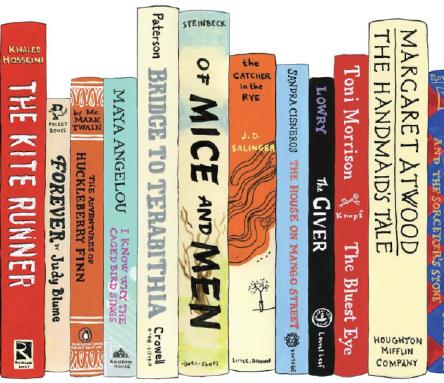
and building one’s attention span could result in more difficulty comprehending and digesting longer works of literature that could be encountered later in life, including college reading and critical documents. Furthermore, replacing longform works of writing with more artificial digital media could result in missing out on other important benefits of reading. High school students often claim that being forced to read certain books for class or school killed their previous love of reading. Whether they don’t enjoy the books assigned in school because the material is incomprehensible or whether they just don’t connect to these books, it seems as though people commonly stop reading due to school.
Benefits of Reading Reading has obvious benefits that explain the importance of English and literature classes, such as increased abilities to critically analyze works of writing – a skill necessary for future success in college and the workplace. Even reading books assigned for school can introduce students to new genres they may never have picked up or teach students time management through finishing material on time. However, reading for pleasure outside of school can bring even more benefits.
The Social Inequalities in Cognitive Scores at Age 16: the role of reading research from the University of London’s Institute of Education (IOE) found that children from ages 10-16 who read for pleasure make more progress in spelling, vocabulary, and math than those who read less. In fact, study author Dr. Alice Sullivan discovered that, “The combined effect on children’s progress of reading books often, going to the library regularly and reading newspapers at 16 was four times greater than the advantage children gained from having a parent with a degree.” Moreover, reading has benefits beyond just the classroom, especially if the book is something you choose of your own volition. Not only have researchers found that reading fiction especially showed higher scores on empathy tasks
and increased correlation of social support, but reading can also introduce a new community of other readers to bond over these stories, explaining the widespread popularity of book clubs. Reading also engages people with their imagination as the mere act of reading forces the reader to visualize the world and characters in their mind. A 2014 study by Carnegie Mellon University found that reading a chapter of Harry Potter used the same brain regions as seeing someone move in real life. Finally, research supports that reading can be a significant stress reliever with a study from Mindlab International at the University of Sussex, which found “reading to be 300% better at reducing stress than going for a walk and 700% more effective than playing video games.”
While it may seem like the blame is on digital screens and social media, the Internet and social media have sparked a sudden reinterest in reading. Social media platforms like TikTok, YouTube, and Instagram have turned reading into somewhat of a trend with certain books becoming viral over the Internet, and their covers becoming new staples of the reading community and inspiring new readers to flock to these platforms’ content and posts. The popularity of books online has spread into bookstores as well, as you can easily find a #BookTok table filled with trending books at many Barnes and Noble locations. Even book sales have gone up due to online popularity, with young adult fiction sales rising by 30.7% and adult fiction increasing by 25.5%. In fact, four out of five YA bestsellers have had the chance to become viral on the book community of TikTok. Although social media has been correlated with a decrease of reading among teenagers, perhaps it can also introduce more adolescents to reading.
Find recommendations online - Whatever your
niche is, a community of readers who share your interests can always be found online. Between online articles, forum posts, and social media posts, the recommendations for books are endless, and it is near impossible not to find someone who shares the same reading tastes as you.
Or from your librarian – The librarians at the local libraries and inside our very own school would be more than happy to try to personally recommend a book you may like, whether you’d like to stick to your favorite genres or explore a new territory. You can even ask your very own teachers!
Start with graphic novels or shorter books – Heavy, long books can be intimidating to pick up, so graphic novels, short stories, and short books can be more approachable. Comics and graphic novels add visuals to their stories and are usually easier and quicker to read through, and shorter books can deliver a great story in just a few hours of reading.
Audiobooks – One of the hardest habits when reading long-form works is keeping your attention on the page, but audiobooks can help you focus on what you’re both hearing and seeing at the same time. They can also be more convenient for those with busy schedules as you can still listen to the work while on your daily commute or doing chores.
Don’t feel forced to read books that you don’t enjoy – Of course, you have to read that book assigned for school, but trying to finish a book you may not enjoy in your free time can diminish your love of reading quickly. Read the books you like, despite what reviewers or critics may say.
Stay positive – Stepping back into reading can be daunting with the sheer number of books that exist, and it can be easy to feel dejected when you have trouble finishing a book. But even so, finding a book you like and being sucked into its world or prose can be more than worth it in the end. Have fun with the books you read and let yourself be immersed in them.
Source: www.pbs.org
As the school year comes to a close, everyone cannot wait for a well-deserved break. Just because we all want to relax this summer, though, does not mean we should waste our summer away doing nothing. While,yes, summer is about having fun, we can still find ways to be productive. Here are some top ways to have a productive summer.
First, it’s always a good idea to prioritize yourself. A healthy lifestyle can help you in endless ways, and you will thank yourself for employing healthy habits not only in a week or two, but also when you
are all grown up. You’ll feel more energized, and eating healthier, for instance, is proven to boost your mood. Some great examples of ways to improve your physical health are…
1) Getting a gym membership
2) Eating healthier
3) Going for daily walks
4) Finding an outdoor hobby (playing sports, gardening, etc.) Another way to have a productive summer is getting a job. While it may seem daunting at first, finding a job as a teenager is not as hard as it seems. There
are plenty of local businesses that are looking for teenagers to work, whether they are local camps, restaurants, or stores. While you’re working, you’ll naturally become a more responsible, organized, and more mature version of yourself. Even if you’re not working with friends, you will have a great time. It is easy to make friends with coworkers – I, for instance, have found friends at my job, and I never would have expected my work to affect me as much as it has.
The final way to have a productive summer is to
make your resume as appealing as possible. As high school students, college is always in the back of our minds; thus, it’s always best to start as soon as possible. Ways to do this include volunteering in your community, taking an online college course, or attending leadership camps. One leadership camp that many junior boys and girls are attending is called “Boys State” or “Girls State.” Both offer a handson, realistic experience in civic responsibility for rising seniors.
My final piece of advice is to try something differ-
ent because it’s summer! We have the time to do so, so spend your time wisely, get out of your comfort zone, and have fun!
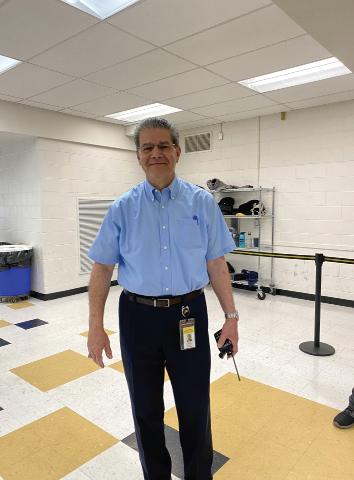 by Audrey Gang
by Audrey Gang
Superintendent Mr. Patrick Fletcher will be retiring after 17 years at River Dell.
A trained Business Administrator and Certified Public Accountant, Mr. Fletcher earned his bachelor’s degree in government and law at Lafayette College and later received his graduate degree in Educational Administration at Seton Hall University. He also earned many postmaster’s credits at other institutions, including Bergen Community College.
Prior to leading River Dell in 2006, Mr. Fletcher served as the business administrator/board secretary for the Closter and Englewood Cliffs school districts before serving the Glen Rock Public Schools in various administrative positions for 14 years. This year, he is wrapping up his 17th year at River Dell.
Throughout his time at River Dell, Mr. Fletcher was recognized for his efforts in leading the district and supporting student successes. Some of his most notable accomplishments include 2014 New Jersey Association of School Administrator’s (NJASA) Northern Superintendent of the Year Award and 2018 NJASA Distinguished Ser-

vice Award.
Among his proudest achievements is being one of the first members of “The Flight Team,” a group of highly trained individuals who would respond to crises in other school districts. The team was created just after the terrorist attacks that occurred on September 11, 2001.
Mr. Fletcher says enjoys working at River Dell and is always excited to surround himself with “highly motivated students and staff… it makes every day an opportunity [to learn something new].” Indeed, one of his favorite mottos is, “It’s always 75˚ and sunny at River Dell,” which reminds him of the wonderful community at River Dell.
Mr. Fletcher loves in-
“Being a math teacher was like being a dentist; no one likes going to the dentist.”
It may come as a surprise that Mr. Principe, River Dell’s assistant principal, supervisor of guidance, and former math teacher, would admit such a thing. But after 29 years at River Dell, he can relate to a misery that many high schoolers face in school: math class. In fact, his view of mathematics is what helped shape his remarkable goals and accomplishments throughout his career, and there is much we can learn from him before he retires.
Throughout high school, Mr. Principe played basketball on his school team before he went on to coach baseball, basketball, and football at Weehawken High School and River Dell High School for a couple of years. As a high school senior, Mr. Principe wanted to become a P.E. teacher but felt drawn to math when he realized his passion for teaching others. Convinced by his peers about the lack of opportunities for a math career, however, his start at River Dell was delayed another ten years. It was only when he was offered a teaching job while he was a River Dell coach that he began teaching math. Mr. Principe says that his love for coaching and teaching
“really propelled me to be a teacher.”
Moreover, reflecting on his time in high school, Mr. Principe shares, “I remember the teachers who made a difference in my life, both outside of academics and as a teacher…I took those things and I said, ‘I’m going to teach the way Mr. So-andso or Ms. So-and-so taught me in high school.’” Efforts to make class seem less of a chore and more fun – a skill Mr. Principe admired growing up – shaped his aspirations when he started teaching math. “I want you to like coming to my class,” he shares about his time teaching. He frequently went to extra help when he was a student, so Mr. Principe understands the struggles of math, but he also acknowledges the power and satisfaction of sitting down to solve a complex problem independently.
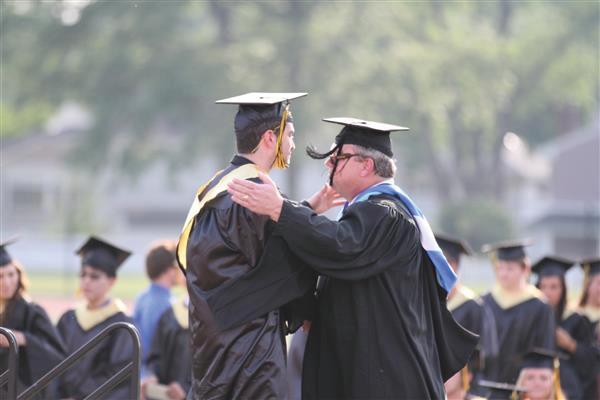
Over the years, it has been undeniable that Mr. Principe’s teaching wasn’t just effective, but inspirational. Just like how Mr. Principe’s teachers motivated him to become a teacher, the cycle continued, as some of his students decided to pursue teaching careers because of him. Mr. Principe remarks, “That, to me, tells me I’ve made a difference in their lives, not only in teaching but also as a coach.”
While he values being an engaging teacher, Mr. Principe encourages students to reciprocate this enthusiasm and challenge what they are told instead of simply accepting it. He wisely advises, “if you have a doubt, you should always question it. You have the right to question it.” Despite being an influential teacher, he remarks how learning from others is just as important. “They [students and staff] challenged me, and because they challenged me, they made me so much better of a teacher than I could ever imagine to be, so I thank them for that.” When asked for any words of advice for students, Mr. Principe answered, “if there’s something that they don’t like, fight for what they believe in. Question everybody: their teachers, their administrators – question.”
After Mr. Principe leaves River Dell, he looks forward to being a first-time grandfather, playing golf, and walking his dog. He blissfully recalls his time at River Dell, “It’s been 29 years and I wouldn’t trade it for the world.”
On behalf of the students of River Dell, neither would we. We thank you for all your contributions to River Dell. Enjoy your retirement!
teracting with people of all ages, and his outgoing and friendly personality has been reflected in his interactions with the River Dell students and staff.
“One of my favorite memories is playing chess with a student who had special needs and was unable to communicate verbally,” he recounts. “We would play two or three times a week at lunch. I loved to see him laugh whenever he outsmarted me.”
When asked about his plans for retirement, Mr. Fletcher looks forward to spending time with family and “visiting every national park in America.”
Bon voyage, Mr. Fletcher, and thank you. River Dell will miss you!
Congratulations, Mr. Principe!
than the rest of the club for the state competition. The remaining members had to write either a 10-page or 20page paper to participate in SCDC. This year was the first time 14 students at River Dell wrote essays to participate in states. The competition began at an introduction ceremony in Atlantic City, New Jersey, where students greeted each other before the work began.
ing to an actual business convention. It builds your presentation and public speaking skills.” She continues, “Although we went into it unprepared since we didn’t know what to expect, the other competitors motivated and encouraged us to try harder.” Due to their achievements in the States round, Sydney and Bria earned a chance to participate at Nationals in Orlando, Florida, which was held in April.
Distributive Education Clubs of America (DECA)a business club - takes part in a larger national organization that hosts competitions centering on roleplaying business situations and practices.
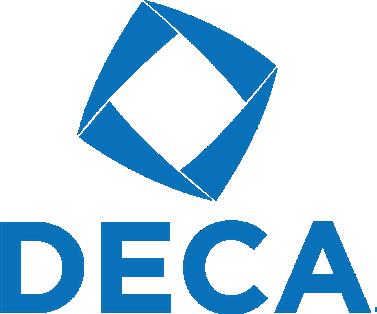
With Mrs. Lenihan as the club advisor, River Dell’s DECA allows students to enhance their business knowledge by offering many enriching
experiences. On February 27th, 16 students went on a three-day overnight trip to Atlantic City, New Jersey, to perform at The State Career Development Conference (SCDC).
Before the SCDC, the club members participated in the districts’ competition.
Aaron Okrainsky and Darsh Patel qualified for the SCDC and had the opportunity to give a different presentation
The following day, Sydney Fojas and Bria Kim, current sophomores at River Dell, won fifth place overall in their topic, IMCP (Integrated Marketing Campaign Product). After the IMCP, Bria commented, “Since it’s my first year in the club, I feel that I’ve gained a lot of experience within the business field; we had to research our product and find different marketing techniques to use. Overall, it’s great! You learn a lot while also having fun with your friends and other students within the club.” Bria encourages other students to pursue this valuable experience in high school. Her partner, Sydney, also recalls that this “experience like go-
From April 22nd to April 26th, Irene Cho, Sophia Cho, Sydney Fojas, and Bria Kim traveled to Orlando, Florida, for DECA ICDC (International Career Development Conference).
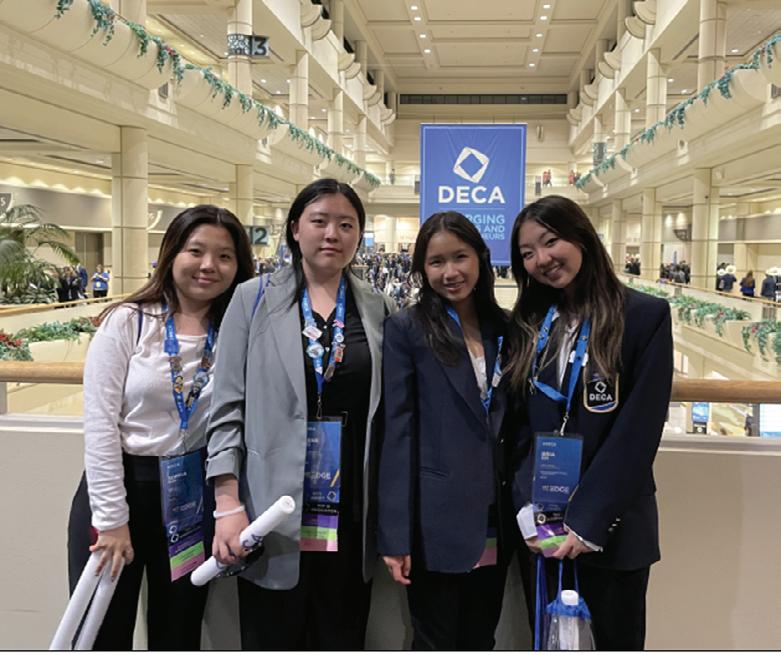
Sydney Fojas and Bria Kim presented their project in the international competition, while Irene Cho and Sophia Cho attended the Thrive Academy hosted at ICDC. Thrive Academy was a two-day leadership seminar where students took the time to listen to various speakers, enjoy social activities, and meet new people. The theme was centered around leadership, but each speaker led their lecture differently; some taught through stories
and others through handson activities, like sharing questions with new people. Overall, they developed students’ leadership abilities and taught them how to apply their skills in reallife situations. In recalling her experience, Irene Cho states, “I got to make so many friends from all over the country, and I met some kids from New Jersey! We got super close in only four days, and we even made plans to hang out together in the summer. I’m so glad I didn’t miss out on this opportunity and thankful to the Board of Education for making this happen!”
This trip was an excellent experience for the students who attended, and they are looking forward to their upcoming years as DECA members.
Each year as spring approaches, many students begin considering their classes for the next school year. Often, difficult decisions, particularly the choice between AP and non-AP courses, must be made. Hopefully, this article will guide you as you decide to AP or not to AP.
What defines an AP class?:
AP classes—short for Advanced Placement classes—are college-level courses. Each AP class requires students to take a final AP exam at the end of the year, usually in May. As a result, these courses are designed with the final exam in mind.
The AP exams are scored on a scale from 1 to 5. With scores of 3 and above, many U.S. colleges allow students to skip college equivalent classes. Here at River Dell High School, AP classes also contribute an extra 5 percent to the calculation of a weighted average. Each AP class focuses on a unique skill set, and the rigor of an AP course varies depending on the subject.
AP versus SUPA: While AP classes and SUPA classes are commonly associated with each other, they have key differences. SUPA, or Syracuse University Project Advance, is a college level course designed by Syracuse University. One reason a student might choose to join a SUPA class is to prepare for a college level class without having to take an exam at the end of the year to earn college credits. In AP classes,
the college credits can only count if the student passes the exam (that is a 3 or above on a 1-5 point scale). However, students should keep in mind that SUPA classes are more expensive than AP classes. As of the 2022-23 school year, SUPA classes cost 115 dollars per credit, while AP classes cost approximately 100 dollars per exam. Furthermore, fewer colleges will accept the SUPA credits than AP classes. If a student is planning to get into a top college, an AP class is recommended because it shows the student is interested in challenging themselves, passionate about a topic, or capable of taking college-level courses. In the end, it depends on how well the student can grow and learn in a class.
It is also worth mentioning that there are some River Dell courses of study that do not offer AP classes. For instance, River Dell does not offer Advanced Placement classes for forensic science, psychology, or economics. Additionally, not all world language classes are offered at the AP level: the highest Italian level is at the SUPA level, and students can take Mandarin until level 4.
Both AP and SUPA classes increase a River Dell student’s transcript by an extra 5 percent to their weighted GPA. However, colleges can still see the unweighted GPA, so in the end, students should still treat an AP class like a regular class in terms of grading.
For more exploration on
SUPA classes, consult the Program of Studies, which gives a comprehensive guide to all SUPA classes, or reach out to your guidance counselor.
How to use this guide: This article digs deeper than the simple curriculum description of each class; we interviewed the teachers who teach the classes as well as students who take them to inform your perspective. The AP courses being offered in the 2023-2024 school year can be found in River Dell’s Program of Studies.
AP Biology
Overview:
AP Biology, taught by Ms. DeRosa Hill, is a class twice as hard as Honors Biology because it is twice as much work, in twice as many periods. When a current AP Bio student was asked to rank the class on a scale of 1-5 for difficulty (1 being least difficult and 5 being most difficult), they rated it a 3.

Ms. DeRosa Hill emphasized that Honors Biology meets every day because it is a double period. The class is an elective and optional, so students who take the class should be highly motivated and interested in the subject matter. Many of the current AP Biology students are interested in studying STEM or biology related fields in college, so AP Biology would prepare students well for college.
Expectations:
Like any AP class, AP Biology is designed to prepare students for the exam in May. There are essay re-
sponse sections in the exam, so students are expected to have established writing skills which iclude providing clear explanations and to think creatively- skills which will be developed and translated into the biology lens. Interestingly, many skills developed from previous classes are utilized for AP Bio, including “knowledge from all previous science classes, logic and reasoning from math, and effective communication from the humanities.” Additionally, according to Ms. DeRosa Hill, students will develop the tools to be an independent learner, which includes not procrastinating, time management, and educating oneself to fill gaps in their understanding. She expects students to space out weekly homework as-
signments which take an estimated three to five hours a week. According to the student interviewee, they spend one and a half hours a week, which shows the amount of time they dedicate to classwork varies from student to student. The current AP Bio student also advises that students prepare early for assessments and ask questions anytime students are confused.
In AP Biology, Ms. DeRosa Hill expects students to be “team players in class” because they participate in labs and activities nearly every day, and contributing to group discussions is what helps them learn.
Traditionally, the summer assignment is a reading and summary of ecology chapters from the textbook with 3 set deadlines for each
Continued on page 8

Mia Acierno
Julia Akdemir
Joey Amapani
Bruno Angeli
Benjamin Arancio
Aaron Arias
Alexandria Aristakesian
Devin Armen
David Arturi
Brianna Azevedo
Mikail Azmat
Isabella Bagnato
Kevork Baltayan
Jessica Barricella
Grace Basil
Elias Bekdas
Gil Ben Yossef
Edward Betar, Jr.
Kieran Boyle
Erin Brady
Brianna Breuss
Timothy Buccos
Eileen Budiyono
Caroline Burmaster
Kristian Bush
Alexander Buzzerio
Seamus Byrne
George Cabany
Alexandra Campestre
Samantha Campos
Jonelle Canete
Alejandro Carballeda
Jack Carey
Danielle Cariaga
Matthew Casado
Jaden Cermak-Hosein
Zoe Chan
Wesley Chang
Ariany Cheley
Mia Cheong
Eddie Cho
Kristen Cho
Irene Choe
Zoe Choe
Jason Choi
Matthew Choi
Audrey Chung
Emma Concannon
Sarah Cookson
Dana Corbliss
Abigail Cordts
Lily Crowder
Evanna Daibes
Mikaal Dastagir
Justin David
Gabby DeGroat
Gisele Domingues
Lakshmi Doobay
Vincent Doornheim
Grace Doss
Ava Ebneter
Jessie Edelstein
Steven Egazarian
Emily Entelis
Hannah Esler
Bruno Esposito
Emma Evancho
Nicholas Fasson
Maeve Flynn
John Forte
Sacred Heart University
Bergen Community College
Villanova University
William Paterson
Clarkson University
Fairleigh Dickinson University
Seton Hall University
Seton Hall University
Colgate University
Rutgers University
Sacred Heart University
Sussex County Community College
University of Delaware
CUNY Hunter College
Fairfield University
Rutgers University
Quinnipiac University
Ramapo College of New Jersey
Bergen Community College
Rowan University
The College of New Jersey
Lehigh University
University of Massachusetts-Amherst
Ramapo College of New Jersey
Manhattan College
DeSales University
University of Delaware
William Paterson University
Rutgers University
Sacred Heart University
James Madison University
William Paterson University
Bergen Community College
Boston College
North Carolina State University
Rutgers University
West Chester University of Pennsylvania
The University of Texas at Austin
School of Visual Arts
Northeastern University
Maryland Institute College of Art
Montclair State University
Rutgers University
Lehigh University
Stony Brook University
The University of Tennessee
Ithaca College
University of Scranton
University of Rhode Island
University of Mississippi
Montclair State University
West Chester University of Pennsylvania
Fairleigh Dickinson University
West Chester University of Pennsylvania
Binghamton University
University of Massachusetts-Amherst
Sacred Heart University
Rutgers University
University of Rhode Island
University of Delaware
Rutgers University
University of South Carolina
University of South Carolina
Bergen Community College
West Chester University of Pennsylvania
Marist College
Glenn Freda
Madelyn Fried
Maxwell Froonjian
Ayva Gallagher
Caitlin Gallagher
Audrey Gang
Nicole Gangemi
Justin Garcia
Zitlali Garcia
Sophia Gardner
Erik Gawrylo
Ava Gewertz
Isabella Gilmour
William Ginch
Arianna Gonzalez
Christopher Gramatges
Gianna Grisham
John Gruja, Jr.
Alison Guinta
Jessica Hacker
Louis Haddad
Theodore Hansen
Cole Haviland
Kylie Hay
Ella Hernandez
Isabella Hernandez
Gavin Hill
Takeru Hiura
Christopher Hlasny
LeeChan Hong
Meghan Hornidge
Alex Hroncic
Christopher Hums
Joelle Hwang
Ashley Hwang
Tyler Iacolina
Alicia Idiculla
Danielle Ingenito
Nina Interiano
Ben Jacobson
Heyang Jian
Stacey Joseph
Ethan Julien
Sunny Juskelyte
Logan Kanestrin
James Karpowich
Joshua Keery
Matthew Kelleher
Tamas Kellermann
Thomas Kelly
Evan Khoo
Alexander Kiernan
Mia Kilmurray
Aiden Kim
Danielle Kim
Ella Kim
Eric Kim
Katie Kim
Sean Jung-Heok Kim
Sean Siheon Kim
Yoon Hyun Kim
Parker Kim
Anna Klein
Ben Klein
Tavsheen Kohli
Quinlan Kraft
Finn Kristan
Sean Langley
Courtney Lee
Danielle Lee
United States Air Force
Binghamton University
Sacred Heart University
University of Florida
Rutgers University
University of Pennsylvania
University of Rhode Island
Ramapo College of New Jersey
Sacred Heart University
Sacred Heart University
Bergen Community College
Clemson University
Wake Forest University
Montclair State University
New Jersey City University
George Mason University
University of Delaware
The College of New Jersey
Franciscan University
University of Iowa
Pennsylvania State University
American University
Montclair State University
Montclair State University
Binghamton University
Binghamton University
Worcester Polytechnic Institute
Lehigh University
West Chester University of Pennsylvania
Northeastern University
Rider University
St. John’s University
Fairleigh Dickinson University
Harvard University
Syracuse University
Cooper Union University
Fairfield University
University of Tampa
Montclair State University
Rochester Institute of Technology
Rensselaer Polytechnic Institute
Dominican University New York
Florida International University
Rensselaer Polytechnic Institute
Bergen Community College
Syracuse University
Kean University
Springfield College
Lehigh University
Lehigh University
Savannah College of Art & Design
Rutgers University
Bucknell University
Rice University
Boston University
Boston University
Boston University
Bergen Community College
United States Military Academy
The Culinary Institute of America
The College of New Jersey
University of Delaware
Indiana University
CUNY John Jay College of Criminal Justice
University of Delaware
Elizabethtown College
University of Manchester
Pennsylvania State University
The New School

Kyle Lee
Nathan Lee
Nicole Lee
Steve Lee
Tristan Lee
Anna Lee
Michelle Lee
Brigitte Lenihan
Bradley Leopold
Matthew Leuzzi
Andrew Lezaja
Thomas Lichtenstein
Lia Liriano
Christopher Lynch
Shannon Lynch
Ingrid Mahler
Lauren Males
Uendi Marko
Drew Mathews
Katrina Matonti
Barbara Matsunaga Tavares
Matthew McCusker
Matthew McGinnis
Brian McGovern
Madison McGuire
Emmett McKeague
Mark McKenna
Katie McLaughlin
Sofia Mendoza
Tiliang Millot
Rachel Mills
Bella Molina
Shahaan Murtza
Erin Nader
Christopher Nastasi
Melina Nastasi
Ava Nemec
Brian Ng
Sofia Nocon
Olivia O’Donnell
Eric Oh
Eliza Olszewska
Reilly Opfinger
Devran Ozkan
Catherine Paeg
Mary Palazzo
Michael Panella
Ellis Park
Miranda Peralta
Nicolas Peralta
Leah Perkel
Meghan Pfohl
George Picinic
Gianna Pitarresi
Dave Plotkin
Henry Pobutkiewicz
Caroline Pollinger
Lilian Posadas
Megan Preziosi
Elizabeth Puentes
Logan Quinn
Abigail Ra
Jefferson Raguindin
Jamie Raso
Joyce Rhee
Abreeana Rilveria
Mark Rittgers
Sebastian Roa
Aaron Rodriguez
Ariana Rodriguez
Bergen Community College
Rensselaer Polytechnic Institute
Rutgers University
Carnegie Mellon University
Tufts University
Ramapo College of New Jersey
Georgia Institute of Technology
University of Arkansas
University of Rhode Island
Rowan University
University of Michigan-Ann Arbor
Fairleigh Dickinson University
Pace University
Marist College
Savannah College of Art & Design
Bergen Community College
University of Maryland-College Park
Fairleigh Dickinson University
New Jersey Institute of Technology
Emerson College
Ramapo College of New Jersey
The College of New Jersey
West Virginia University
Sacred Heart University
Binghamton University
Rowan University
Bergen Community College
Bucknell University
Bergen Community College
McGill University
Rutgers University
Georgian Court University
Babson College
Villanova University
SUNY College of Technology at Canton
Rutgers University
The College of New Jersey
Binghamton University
Rutgers University
Loyola University Maryland
William Paterson
University of Florida
University of New Hampshire
Rutgers University
Rutgers University
Bergen Community College
University of Scranton
Universal Technical Institute (UTI)
Drexel University
University of Miami
University of Rochester
University of Delaware
Ramapo College of New Jersey
Work Force
University of New Haven
The College of New Jersey
Syracuse University
University of Delaware
Ohio State University
Pennsylvania State University
The College of New Jersey
Quinnipiac University
Parisian
Syracuse University
Northeastern University
University of New Hampshire
Ramapo College of New Jersey
Rowan University
Pennsylvania State University
Hamilton Roth
James Ruane
Richard Ryen
Joan Sa
Lana Sawtelle
Isabelle Schneider
Brandon Schoen
Marisa Schoenberg
Matthew Scipioni
Jake Sconza
Anna Sears
Brooke Shirk
Tom Short
Amanda Simon
Emily Sinclair
Emily Skobac
Kayla Smerdon
Aidan Solinas
Andrew Spano
Michael Spano
Nicholas Spelda
Samantha Sta Maria
Lara Subasic
Stephanie Sucasas
Ethan Suede
Nicholas Sybel
Scott Sybel
Can Tang
Brandon Tirpanciyan
Ronak Tolani
Jackson Torres
Ryan Tu
David Tucker
Havin Turkeri
Emily Turschmann
Robert Valenzuela, II
Ava Vanderbeck
Shara VanPraagh
Krishna Venkatesh
Dylan Vertsman
Anna Vidaic
Evan Visaggio-Lopez
Hailey Volmar
Matt Volmar
Kentaro Wada
Larson Walker
Michael Wechsler
Madison Wei
Sarah Weitzenfeld
Jack Welfer
Kyle Wigdor
Amelia Woelfel
Isabella Worthington
Robert Yampolsky
Hannah Yang
Benjamin Yankowitz
Tony Yi
Evelyn Ying
Ren Yoshikubo
Claire Zhang
Joy Zhang
University of Scranton
Ramapo College of New Jersey
Rutgers University
Bergen Community College
Boston University
Coastal Carolina University
University of Washington
Indiana University
Fairleigh Dickinson University
University of Arizona
Quinnipiac University
Fairfield University
Loyola University Maryland
The University of Tennessee
The New School
Ramapo College of New Jersey
University of Scranton
The College of New Jersey
Ramapo College of New Jersey
University of Florida
Montclair State University
Fordham University
The College of New Jersey
Montclair State University
Universal Technical Institute (UTI)
Seton Hall University
Curry College
Seton Hall University
University of Hartford
Coastal Carolina University
Villanova University
Auburn University
Pace University, New York City Campus
The College of New Jersey
New Jersey City University
The College of New Jersey
Lehigh University
Ramapo College of New Jersey
Arizona State University
University of Connecticut
Rutgers University
Sacred Heart University
Indiana University
Rutgers University
Quinnipiac University
Ohio State University
Boston University
Marist College
Lehigh University
Tufts University
Marist College
Sacred Heart University
Fordham University
Villanova University
Rensselaer Polytechnic Institute
Stevens Institute of Technology
New York University
Ohio State University
Cornell University
University of Virginia
Continued from page 1 at the Steinway Tri-State Piano Competition and has won the NJ Music Teachers Association Young Musicians Competition for four consecutive years.
Overall, Audrey is happy with her achievements and is “proud of the hard work, dedication, and perseverance I have invested into pursuing my goals. I will look back on my accomplishments as a reminder of my personal and academic growth.” She
Continued from page 1
also mentions how fortunate she is to have grown up in a “tight-knit” community and extends her gratitude to her guidance counselor, teachers, and friends for the support they have provided her during her time at River Dell.
In a few months, Audrey will be attending the University of Pennsylvania to pursue a major in Biology.
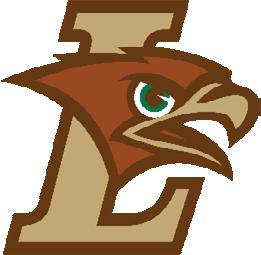

Congratulations Audrey! We know you are headed toward a bright and prosperous future!
focus on school.”
As much as she strives to achieve good grades, Shara knows the importance of having a balance between school and social life, which she credits her parents for. She shares, “My parents always reminded me that success was about happiness and keeping a balance in life, which was instrumental in my attitude toward school.
I have always been a perfectionist that puts a lot of pressure on myself, so having parents that celebrated my accomplishments no matter what, rather than putting additional pressure on
me, showed me that I was more than just a number or a grade. They would remind me that enjoying life and having a healthy balance was always the number one priority.” Shara is especially appreciative of her friends and classmates as well, with whom she made many great memories over the years.
When she’s not studying or partaking in extracurriculars, Shara enjoys listening to music by Noah Kahan, The Lumineers, and Taylor Swift. Her favorite childhood book is The One and Only Ivan, and her favorite movie is Mamma Mia! At River
Dell, her favorite class has been AP Chemistry, which “might sound daunting but Dr. McNamara makes it so fun and manageable.”
Shara plans to attend Lehigh University this fall, where she will study industrial & systems engineering and cognitive science to pursue her goal of becoming a human factors engineer. To River Dell, she says “Thank you for a great four years!”
River Dell High School is proud to have Shara as the class of 2023’s salutatorian and wishes her the best with her exciting, bright road ahead!
Continued from page 5
chapter in July, August, and September. Finally, there is a project due by the first day of school, which is to prepare a brochure to persuade people to vote on a topic based on ecology.
Class Structure:
A typical class day for an AP Bio student starts with a “mini lecture/instruction.”
Ms. DeRosa Hill stressed that she encourages learning through hands-on activities, so she doesn’t spend too long lecturing. Then, students will break out into groups and either do a P.O.G.I.L. (Process-Oriented Guided Inquiry Learning) or a lab activity. Finally, the class will regroup and clarify and review the lesson.
AP Biology has eight units, which means there are two unit tests per quarter. Both Ms. DeRosa Hill and the AP Biology student we interviewed reported that the tests are difficult and require a thorough understanding of the content to succeed. However, for those who struggle with the tests, Ms. DeRosa Hill balances grades with lab and project grades. There are no retake or extra credit opportunities because the class is at a college level; however, Ms. DeRosa Hill is more than encourag-
ing for students to seek extra help.
The AP Test:
Finally, Ms. DeRosa Hill provided encouraging data on success rates of previous students: In 2022, 66% of students got a 4 or 5 on the exam, while 95% received a passing grade of a 3, 4, or 5. This score exceeds the state average
Ms. DeRosa Hill noted that as long as the student is willing to put in the effort to learn, they will perform well.
AP Computer Science Principles
Overview:
AP Computer Science
Principles (AP CSP), taught by Dr. Chu, is an introductory computer science course that is comprised of “55% coding with JavaScript and pseudo code” and “45% noncoding focused issues associated with computing.” On a scale from 1 to 5, with 5 representing maximum course difficulty in RDHS, Dr. Chu gave this class a 3/5 score. When asked to rate the difficulty of this class, current AP CSP students have rated the class a 2/5 in difficulty as well.

Expectations: According to Dr. Chu, skills crucial for AP CSP include “reading comprehen-
sion, writing, logical thinking, good problem-solving.”
In all AP-level classes, students are expected to “…be properly motivated and possess good study habits.” As one AP CSP student put it, “I think it is important for them [students] to consider it is an AP class, so it requires more effort than regular and honors classes.”
Despite this, the AP status of this class should not deter students from taking it. As another student says, “I also think that the ‘AP’ title steers people away by making them think it’s incredibly complex and a super high-level class, when I think it is more than realistic to do well in; you just have to work hard.”
As an AP class, AP CSP does have summer homework. Students are tasked to read a few chapters of an assigned book, complete a short coding course on the website code.org, and create accounts on several online sites.
After the school semester begins, students should also expect to receive 30 to 45 minutes of homework every night. According to student sources, however, the true amount of homework seems to vary more. “We don’t actually have homework very often,” one current student noted. “We used to have more worksheets at the beginning of the year […] When we do projects, we do have to finish them at home over the course of a few days.” Another student also suggests that the course assigns minimal homework. “Dr. Chu rarely gives homework, and, even when he does, it is very little. So, I spend around 20 minutes or less on his homework whenever it is given.”
Class Structure:
Dr. Chu states that the AP CSP class is “30% lecture, 60% hands on coding, 10% assessment.” Assessments consist of quizzes (20% of assessments), unit tests (40%
of assessments), and projects and homework (40% of assessments).
In this class, students can expect to gain a basic understanding of the ways in which computing devices and the internet function. Fundamental programing constructs, including sequential, conditional, and iterative constructs, are also taught. The programming language used in AP CSP is JavaScript. After course completion, students will become proficient in JavaScript at a basic level. Other topics of note include the societal impacts of computing advancements, the top-down design process, and the problem-solving process.
If students find themselves struggling at any point, they can go to extra help hours after school on Mondays, Thursdays, and Fridays. Extra credit and retakes, however, are not offered for this course.
The AP Test:
Dr. Chu proclaims that RDHS AP CSP students “… generally perform much better than New Jersey state averages, which have been much better than the national averages.” The AP Exam solely consists of 70 multiple choice questions. Unlike many other AP exams, the AP CSP exam does not include a section with free response questions (FRQs), or open-ended questions. Instead, AP CSP students are given a final project worth 30% of the final AP Exam grade.
AP Computer Science A
Overview:
AP Computer Science A (AP CSA), also taught by Dr. Chu, is a fundamental Java programming course. On a scale from 1 to 5, with 5 representing maximum course difficulty in RDHS, Dr. Chu gives this class a 5/5 maximum difficulty score. Current students have subjec-
tively rated it 4/5 and 3/5 in difficulty as well.
Expectations:
Similar to AP Computer Science Principles, AP CSA students are expected to possess a strong foundation in reading comprehension, writing, logical reasoning, and problem-solving. As the more rigorous computer science class in RDHS, higher expectations for time-management and study habits are placed upon students. A current AP CSA student says, “Daily study, including assignments and lectures, are not enforced. It is on the students themselves to pay attention, take notes, and complete optional homework in order to maximize their success in this class.”
For AP CSA, the summer homework includes reading a chapter of an assigned book, creating accounts on various coding websites, and reviewing basic coding skills. The summer work is mostly compromised of the assigned reading, which introduces basic information about the basis of the Java programming language.
While most students believe that they should only enroll in AP CSA upon completion of AP CSP, this is not necessary. Although coding concepts and skills learned in AP CSP may be useful, AP CSA’s prerequisites do not include any information taught in AP CSP. However, for those interested in taking AP CSA independently, a current student advises, “It would be best to have a little bit of prior coding experience in Java, Python, or other languages before taking this class. The problemsolving skills and concepts gained from previous coding experience will be incredibly invaluable in this class.”
Throughout the course, students should also expect
Continued on page 9
Continued from Page 8
to receive 60 to 75 minutes of homework every night. Student sources suggest that the true amount of homework is far more variable. One student notes, “Homework in this class is almost always optional and generally takes less than an hour to complete. You might even find yourself not having homework on several days. There is more work when projects are assigned, although they aren’t assigned often. Studying for tests may also take a bit longer, but overall, the workload of the course is more than manageable.” This student warns, however, that students should not “…neglect the optional homework just because it’s optional. Poor study habits will cause weak understanding of the concepts, insufficient coding experience, and subsequently, low grades.”
Class Structure:
According to Dr. Chu, AP CSA class time roughly consists of “30% lecture, 60% hands on coding, 10% assessment.” Assessments consist of quizzes (25% of assessments), unit tests (60% of assessments), and projects and homework (15% of assessments). The course is divided into various units covered on the AP Exam, which are taught to students through class lectures and homework assignments, typically on a website called code.org. Each unit is concluded by a unit test consisting of multiplechoice questions and freeresponse (open-ended) questions that require written code.
This class provides students with basic proficiency in Java, some familiarity with Object Oriented Programming, and problemsolving skills necessary for coding. As a coding class, students who take this class should primarily seek to gain hands-on coding experience in Java.
Dr. Chu offers extra help on Mondays, Thursdays, and Fridays. This class does not offer test retakes or extra credit assignments.
AP Test:
Like AP CSP students, Dr. Chu’s AP CSA students “…generally perform much better than New Jersey state averages, which have been much better than the national averages.” The AP CSA fi-
nal exam consists of two sections: a multiple choice and free-response (open-ended) coding section. The multiple choice section includes 40 questions, and the free-response section contains four questions.

AP Chemistry Overview:
AP Chemistry is taught by Dr. McNamara. As it is an AP science class, the class is designated to two periods, and taking AP Chem means having the class on all rotation days. The class expands on what was taught in the previous sophomore chemistry classes to prepare for the AP exam. For students interested in pursuing STEM or medical related careers, the AP course provides an advantage by covering all of the topics taught in General Chemistry college classes.
Expectations:
It goes without saying that AP Chemistry is a class that requires motivation and selfstudy skills to succeed, especially as the course moves at a rapid pace of covering a topic a day. According to Dr. McNamara, it’s important to not just to be challenged, review concepts, and participate in class, but also work in an environment with others that requires teamwork to complete activities and labs (which don’t require full lab reports). Dr. McNamara also offers a variety of resources to review materials, such as practice problems, textbook readings, websites, and videos and she believes,“Wrong answers and ‘dumb’ questions provide excellent learning opportunities,” so don’t be afraid to ask questions!
To prepare for the class during the summer, Dr. McNamara assigns a partly optional review of the previous chemistry class the student took. She also offers virtual review sessions on Teams to go over them. Once the school year starts, Dr. McNamara recommends her students take thirty minutes a day to go over lessons, which helps them prepare for upcoming assessments and retain information better.
Class Structure:
Another aspect of Dr. McNamara’s class, which many students may appreciate, are the test retakes, which give students the opportunity to earn back half of their lost
credit. Because “Students have to be able to master a great deal of material and then use that knowledge in a holistic way,” Dr. McNamara says she believes retakes are important “because I think it provides students a real opportunity to reexamine their understanding of the content and their approach to the question.” Moreover, for a better idea of what the tests look like, the “free response question may draw on knowledge from three or four different units. In addition, the questions themselves are often designed to test a student’s ability to read critically and decipher what the question is asking, what information given is essential, and what information is there to distract.”
The AP Test: Dr. McNamara’s teaching style is certainly paying off. Combined with students’ hard work, there was “an 87% pass rate (score of 3+) and 50% of the students scored a 4 or a 5” on the AP test during her first year teaching the course last year.
As the class is generally small-sized, Dr. McNamara shares that “everyone is welcome—so I really get to know my students and they get to know each other. There’s a great sense of teamwork and togetherness in our common goal.” While the class should be expected to be rigorous, it doesn’t go without fun.
AP Literature AP Literature is taught by Mrs. Vogt. In the classroom, students learn how to evaluate, analyze, create, and support claims based off a variety of media, including fictional novels, poetry, and drama. Students also debate these works in class with thought-provoking and meaningful discussions. According to Mrs. Vogt, a student’s writing should “… make an argument, and then you illuminate your argument… you’re bringing it to light.”
Some skills essential to AP Literature include close reading, identification and interpretation of literary techniques, and analyzing arguments. Students receive a first taste of this during the summer assignment, which is comprised of reading and taking notes on The Great Gatsby and writing respons-
es to two poems.
As students begin the school year analyzing and discussing a wide array of literature, there is the freedom of making an argument and then bringing it to life. Students learn to go deeper and make advanced connections, such as how an author’s life during a certain time period affected the literature they wrote. As the year progresses, students thus gain an advanced understanding of the author’s perspective, identifying and analyzing the literature, and crafting a thesis that not only is unique, but one which can be connected to the current world. Mrs. Vogt especially values that even though, “I could tell you what happens in the book, and I can tell you important things that happen… what I really want you to do is to see all these things for yourself and have something to say.”
Mrs. Vogt’s class consists of reading, writing, group work, and discussion. While the course requires students to read and annotate outside of class, the work is often revisited and discussed in class. Additionally, students write 40-minute timed impromptu essays throughout the year, which helps them think, develop, and pull ideas together at a faster pace, a crucial skill for the AP test. According to Mrs. Vogt, students generally score a “3, 4, 5; [there are] more fours and fives than threes” on the AP Literature test.
While no retakes are offered for any assessments, Mrs. Vogt is available for extra help after school and offers plenty of other classwork opportunities to earn credit.
Additionally, Mrs. Vogt prefers to leave her students in charge of their own calendar instead of assigning a set amount of homework per night. Students receive readings and assignments about a week before they are due, giving ample time to complete them. Occasionally, Mrs. Vogt works with the students to allow the class to decide on project due dates together.
While AP Literature, like all other AP classes, requires time and effort, Mrs. Vogt advises students to be open minded when it comes to taking APs. She notes, “There’s a perception that if you’re a science person, then you’re not a literature person, and I don’t follow that way of thinking. I look at it as, [being] a thinker in science transfers to, in a class, being a problem solver and a thinker in literature. You are setting forth an idea, whether it’s a thesis statement, an argument, or an hypothesis, and then you have to figure out how valid it is... In science you work with variables, and in English you work with texts.”
AP Language & Composition
AP Language & Composition is taught by Ms. McGinley. The summer assignment is mandatory for the class. While it changes every year, it usually consists of reading and analyzing a text in preparation to write an essay.
Once the school year kicks in, Ms. McGinley prefers to assign long term assignments over daily homework, informing students about the due date “two or three weeks [prior], so students can budget their own time.” As Ms. McGinley gives students ample time to prepare, this means that time management skills, rather than completing it the day before, is a must. Students also receive the due dates of all major assignments in September.
As for the students’ ambitions, Ms. McGinley states that students “have to be very organized, strong in your time management… We are focusing on building reading, writing, and speaking skills. We do a lot of rhetorical analysis and synthesis, and we take all those skills and sort of spiral them through all sorts of assessments.”
Throughout the year, the class looks at many different texts to analyze, such as podcasts, speeches, newspapers, and poetry. For Valentine’s Day, Ms. McGinley tasked her students to analyze historical love poems on a one pager. Additionally, as for what each class period consists of – it’s never the same. Ms. McGinley likes to think outside the box, sometimes having guest speakers come into the class to help enforce real world rhetoric. Moreover, she says, “Some days we have discussions, some days we do timed writes, we do a lot of groupwork, a lot of working through challenging questions and prompts… Every day is different.”
As for the exams in class, they generally consist of “40 minutes of writing.” Ms. McGinley says she tries “to simulate the [AP exam] in class.” She believes that the effort the student puts in is an indicator of their success. “If you work hard, then I think you’ll excel.”
Ms. McGinley is available for extra help by appointment. No extra credit or retakes are offered in this course.
Lastly, AP Language is a class that constantly evolves with its students and realworld events. Students bring their own personal viewpoints and discuss recent events, learning to work as a team. “As we read nonfiction, we could talk about current events that I couldn’t plan for… Students can bring in their own interest and we can evolve the class that way… We are very much a team as we work throughout the year” says Ms. McGuinley.
AP Statistics
Overview:
AP Statistics is a foundational college-level statistics course taught by Mrs. Clark that introduces fundamental statistical concepts. On a scale from 1 to 5, with 1 being least difficult and 5 being most difficult, Mrs. Clark ranks her class a 4/5 in difficulty. Other current students have ranked this class a 3/5 in difficulty.
For students considering this class, it is important to
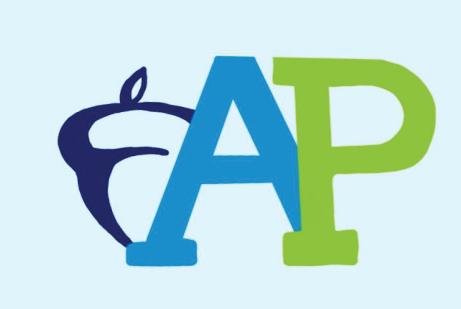
Continued from Page 9
think about future college endeavors, as many college programs require statistics for graduation as opposed to calculus—a fact that students are often unaware of.
Expectations:
One major misconception surrounding AP Statistics is that it holds the same expectations as a typical math class. As an applied math class, AP Statistics requires students to practice other skills not typically needed in regular math classes. For instance, Mrs. Clark remarks that the class “…requires a great deal of writing which many students are not used to.” Of course, proficiency in mathematics is still very helpful to succeed in this class.
The summer assignment involves learning the first unit of AP Statistics—one variable data. In the past, students have also had to complete guided readings and solve textbook problems. During the summer, students are offered two checkin dates where Mrs. Clark reviews and provides feedback on the summer work. Also expected to be completed is a “Getting to Know You” assignment due by the first day of school.
Students should expect to receive approximately 30 minutes of homework—typically on OneNote— every night.
Class Structure:
Prior to the AP exam, most classes in AP Statistics are spent learning a collaborative, hands-on statistics lesson. More specifically, Mrs. Clark mentions, “Every lesson comes with an activity (many times with sweet treats) where students work together and use their prior knowledge to develop new ideas.” At the end of each lesson, the main points of the activity are summarized, and notes are provided for the lesson. Students then practice their new skills with “Check Your Understanding” questions. A current AP Statistics student stresses that it is “…a very consistent class: all lessons and assignments are structured in an orderly manner. Class time almost always runs with the same general schedule, and assignments—including homework, extra credit, quizzes, and tests—are very predictable. Mrs. Clark’s highly-organized teaching truly makes the wide range of topics covered in AP Statistics a lot easier to handle.”
As for assessments, AP Statistics grades mostly come in the form of quizzes and tests. All quizzes are take-home quizzes, and all tests are given after finishing a chapter of the AP Statistics curriculum. After the AP Exam, students may be given projects or interactive statistical activities for the remainder of the school year,.
In addition to introducing fundamental statistical concepts, the AP Statistics course trains students to critically analyze data they are presented with in real life. As Mrs. Clark states, “Statistics is an applied math class, and its applications extend
far beyond the classroom. We live in a very data driven world and it’s important to be skeptical of how this data is collected and presented to you. I tell my students on the first day of school that I would love for them to get a 5 on the exam but I was more concerned with them becoming educated consumers of data.”
If necessary, Mrs. Clark is always available for extra help throughout the school year. Students are able to gain extra credit—a two percent boost—and qualify for a test retake upon watching AP Daily Statistics videos on the website AP Classroom and completing guided notes corresponding to the videos before an upcoming test. Only students that score below an 85 on a test are eligible for test retakes.
The AP Test:
For RDHS, the pass rate (3 or higher) on the AP Statistics exam is generally around 75%. The test itself is divided into two sections: a multiple-choice section and a free-response (open-ended) section. There are 40 multiple-choice questions and six free-response questions.
AP Physics C
Overview: AP Physics C, taught by Mr. Pohling, is a calculusbased, college-level Physics course. According to Mr. Pohling, on a difficulty scale from 1 to 5, “Many students would find the AP Physics content challenging and would rate this course a 5 in difficulty.”
For students interested in learning physics but concerned with the difficulty of AP Physics C, Mr. Pohling suggests signing up for AP Physics regardless. As stated by Mr. Pohling, “I believe you will find this course very rewarding, even (and especially) if you find yourself confused at times. That’s a necessary part of learning physics!”
Expectations:
AP Physics C requires students to conceptualize motion with assumptions and express the associated physical models using mathematics. As a result, logical and abstract thinking abilities are of high importance in this course. Additionally, to understand descriptions of motion, reading comprehension is also crucial. As expected, mathematical capabilities are also of utmost importance in AP Physics C. Throughout the course, math skills learned from all four high school math subjects— geometry, algebra, precalculus, and calculus—all must be applied. “The equations of motion can get somewhat convoluted for a few of the lab activities, but on most assessments, the math isn’t as difficult as you would think,” Mr. Pohling notes. “What students find most challenging are the physics concepts themselves.” Going against traditionally helpful skills, he also stresses that memorization will not be helpful in AP Physics. “A student could memorize every equation used in every practice problem, but that won’t be useful in understanding the
broader context and necessary assumptions for those equations to be properly employed” he says.
Aside from academic abilities, Mr. Pohling states it is important that AP Physics students possess “…curiosity, courage, and persistence” in order to “…ask seemingly trivial or outlandish questions that place assumptions in a broader context” as well as “…answer questions incorrectly with the aim of exposing misconceptions.”
Before starting the school semester, summer homework—including a quick survey, a two-paged math review, and a very short reading of advice from previous students—is assigned.
After beginning the school year, AP Physics students can expect to receive less than one hour of homework each night, in the form of readings and ungraded practice problems, which will later be discussed in class. Mr. Pohling emphasizes that AP Physics C is mostly about understanding underlying concepts in mechanics rather than completing assignments. “The most successful students,” he states, “will spend significant time outside of class thinking about physics, reading about physics and discussing physics with their friends and family, because they are interested in the subject and not because of any required ‘work’ that is assigned.”
Class Structure:
During class, one-third of class time is spent partaking in lab activities, the focal point of AP Physics C. Every lab activity takes two consecutive days to complete, with the first day being used to collecting measurements and the second day being used to derive information from the measurements, as well as to compete for the lowest percent error in results. Aside from lab activities, the class also consists of lectures, discussions, demonstrations, problem-solving, assessments, and AP practice. Each lesson builds on the previous, so students who are often absent may especially struggle.
Overall, there are two to three overarching concepts in every unit of AP Physics C. Students who understand these concepts may find AP Physics C to be “remarkably easy.” Each assessment, including the AP exam, is curved, and lab and project grades are able to counterbalance suboptimal test grades. While Mr. Pohling admits that it is difficult to obtain a 95 or higher in the class, it is also difficult to maintain a C or lower in the class.
Students will gain a better understanding of the motion of objects according to classical mechanics after completing this course. Since, as Mr. Pohling puts it, the AP Physics C curriculum only “… scratches the surface of our present understanding of the physical world,” students are admittedly left with more questions than answers. However, the fundamental concepts learned from this class are sure to benefit stu-
Source: www.wikimedia.org
dents’ future ventures in science and engineering-related fields.
For AP Physics students who are in need of assistance, Mr. Pohling offers extra help on Mondays, Tuesdays, and Thursdays after school as well as before school by request. Students who correct Mr. Pohling’s mistakes on answer keys are awarded with extra credit.
The AP Test:
On the AP Exam—which is comprised of a multiplechoice and free-response (open-ended) section— more than 80% of RDHS students pass (obtaining a 3 or higher). Most students score a 4 on the exam; however, multiple students are still able to score a 5.
AP US History
Overview: AP U.S. History—commonly abbreviated as APUSH—covers U.S. history from 1491 A.D. to the present day. In RDHS, it is taught by Mr. O’Toole, who ranks this class a 5 or 6 in difficulty on a scale from 1 to 5. Mr. O’Toole attributes this to the “…great deal of reading at the college level” and informs that it is “much harder and more time consuming than an honors class.”
Admittedly, APUSH is a rigorous class, requiring a great investment of both time and effort.
Expectations:
To succeed in APUSH, students must display historical thinking skills in “…developments and processes, sourcing and situation, claims and evidence in sources, contextualization, making connections, and argumentation,” as stated by The College Board. The development of these skills aims to encourage students to train habits necessary to critically analyze the past.
More specifically, skills such as time management, general critical thinking, evaluation, historical argumentation, reading comprehension, and writing are of utmost significance.
The challenging summer homework consists of several parts, designed to help students recall information covered in U.S. History I. One example of a summer assignment includes memorization all 46 U.S. Presidents in chronological order, reading a few chapters of a college-level textbook, and completing general review of information from U.S. History I in preparation for a test at the beginning of the school year.
Throughout the course,
students should expect to receive one to two hours of homework every night. On the weekends, more homework may be assigned. Students with better study habits are able to complete the assignments more efficiently, so the true length of the homework assignments may vary depending on the student.
Class Structure:
For each APUSH class, students generally arrive having completed homework assignments the previous day. Class time is spent expanding on those concepts and often includes examining and discussing primary source documents. In these class discussions, all students are expected to participate productively and in a meaningful way. In addition to the analysis of primary source documents, APUSH seeks to teach students skills and methods that will support them as they prepare for the AP Exam.
APUSH students can expect to leave the class with a solid understanding of U.S. history. Throughout the class, students will learn about seven APUSH themes, nine historical eras, and various other trends that have influenced the development of the U.S. As an effect of the intensive reading, writing, and analysis in APUSH, students will also be able to read, write, analyze, and discuss crucial topics at the college level.
Students who are in need of help are able to schedule extra help appointments with Mr. O’Toole. Retakes are only offered if absolutely necessary and would be considerably rare and unusual.
The AP Test:
Thankfully, RDHS students generally perform “exceptionally well” on the AP Exam, according to Mr. O’Toole. Over the past five years, the average school on the AP Exam was 4.124, including the school years influenced by the COVID-19 pandemic. Mr. O’Toole attributes the success of his students to “…the rigor and high expectations of the course.”
The APUSH Exam itself is separated into four parts: a multiple-choice section, a short answer section, a document-based question (DBQ) section, and a long essay section.
See our next issue in September 2023 for Volume 2, in which we present the remaining AP course offerings at RD.
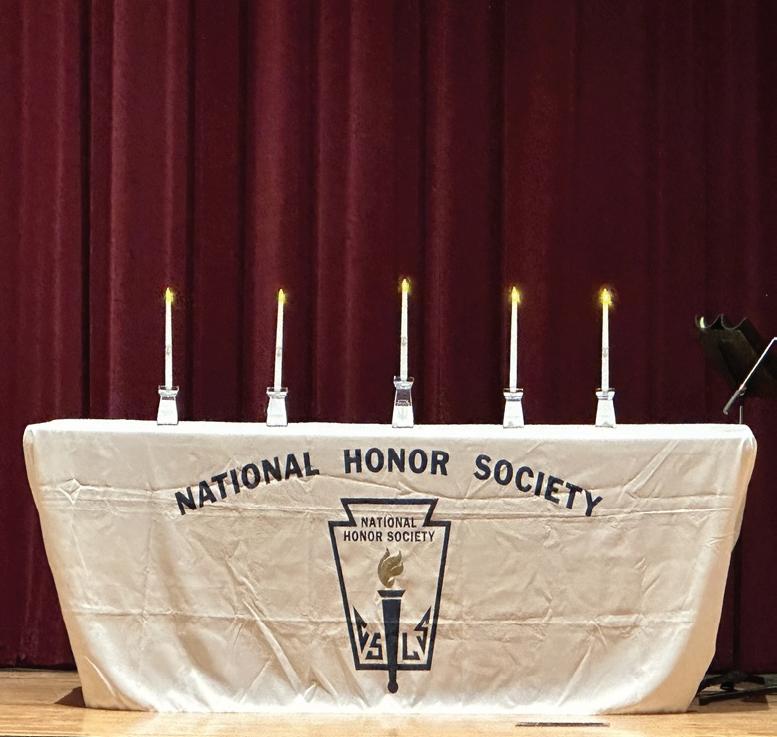

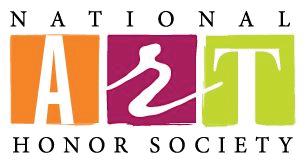 by Danielle Cariaga
by Danielle Cariaga
River Dell has numerous activities and extracurriculars for their students to indulge in. Some of these groups take their efforts to the next level – giving back to their community and making changes around them. The various honor societies at RDHS are meant to appeal to the interests of students and make the world a better place. This article serves as a guide and introduction to all the honor societies and provides an overview of how to prepare if you’d like to apply. Even if you are not yet eligible, this article will provide insight for when you eventually apply.
There are 10 Honor societies: The Art National Honor Society, Chinese Honor Society, French Honor Society, Italian Honor Society, Mu Alpha Theta (Math Honor Society), National English Honor Society, National Honor Society, Science National Honor Society, Spanish Honor Society, and Tri-M (Master of Modern Music) Honor Society. All are uniquely different but equally as important as the others.
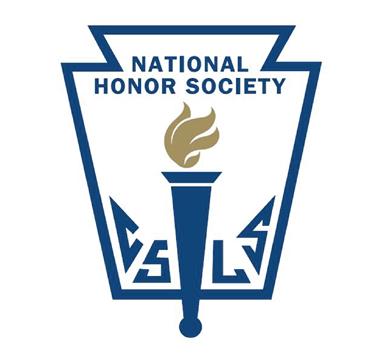
the other members of the society and providing service to their community.
The National Art Honor Society consists of art students who have a passion to continue developing their art within society. The NAHS hosts volunteering events throughout Oradell and River Edge in hopes of beautifying the towns with students’ artwork. The most recent project was the painting of storm drains to spread awareness about the harms of plastic waste and littering. Students who have taken two year of art class with an average of 90% and above are eligible to apply. Students can begin to apply in early September during the Club fair. If they are accepted, they will be inducted in the same school year.
The French Honor Society also strives to help the community through fundraisers and tutoring. Sophomores who have an overall grade of 91% or above are eligible (overall grades are a combination of your Freshman and Sophomore marking period grades). There is no application process for this society, it is solely based on your grades in French class.
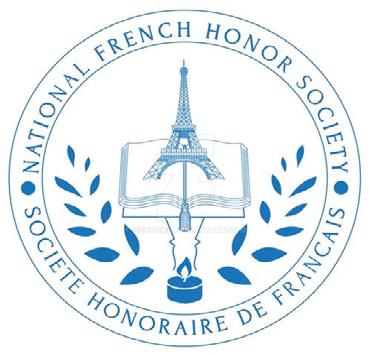
also host community service activities and events that foster interest in mathematics. Mu Alpha Theta requires that its members are in honors, AP, or SUPA mathematics courses for at least six marking periods (3 semesters – sophomores and juniors only) before they apply. Furthermore, the student must show strong characteristics of academic integrity, work ethic, potential in mathematics, and no record of academic dishonesty. Eligible students should receive an email from Ms. Metts or Mrs. Borges, but in case they don’t, they should contact Mrs. Borges by the end of March in their sophomore or junior year.
The National Science Honor Society offers students the opportunity to serve other communities using their scientific gifts and passions. Members are expected to embrace their love for science through volunteering (tutoring/science-related activities). Sophomores who have received outstanding grades in their science courses and demonstrated intellectual vitality in the sciences are invited to SNHS and inducted in their junior year. Applicants are expected to maintain an overall weighted average of 90% or above in all their Honors, SUPA, and AP science courses.

open to sophomores, juniors, and seniors. They must have a 91% weighted average for three consecutive semesters in an Honors Spanish class or a 94% in a CP Spanish class. Additionally, students must have already taken Spanish II or higher. Members should be prepared to do at least 10 hours of Spanishrelated community service activities like tutoring and fundraising.
The Chinese Honor Society works to spread Chinese language and culture throughout the community. In an effort to share their knowledge of the Chinese culture and language, they provide services like tutoring and fundraisers. Sophomores who are taking Mandarin with an overall grade of 92% or above may send their grade to their teacher after the second semester. These students must realize the responsibility of being a member of the Chinese Honor Society, including helping

The Italian Honor Society is for passionate Italian language students who wish to spread the Italian culture throughout the River Dell community. The members are creative leaders who take initiative and organize school activities. Candidates must have a final grade of 95% or above (Freshman year and Sophomore year) in Italian as well as an average of 85% in all other classes since freshman year. The members of the Italian Honor Society are expected to attend member meetings, tutor fellow students, and facilitate fundraisers. Furthermore, active members of the Italian Honor Society are eligible for scholarship money. Students can apply by emailing Signora Uzzi screenshots of their report cards since Freshman year. The deadline for this year’s application was March 20th, however, it is never too early to start preparing for next year’s application.
The National English Honor Society is for those who want to promote literacy both in and out of the River Dell community. Apart from putting this achievement on college applications, Students in the NEHS have the ability to compete for scholarships and spread their love for reading and writing. RD students who are a part of the NEHS are required to have taken a consecutive two years of Honors or AP English. Furthermore, the students must have a 90% or higher in each of their Honors English classes and English electives. Applicants are invited to apply in March.

The Spanish Honor Society encourages students to develop their service skills and character. The SHS places a heavy emphasis on community service as well as civic engagement with local and global communities. Each year, they raise money to make donations to those in need. This year, the members of the SHS raised money to make a $300 donation to support the World Central Kitchen, a non-profit organization devoted to providing meals in the wake of natural disasters. Students who are interested in applying must be enrolled in a Spanish class and must take Spanish courses until graduation. The application is only

Last but not least, the Modern Master of Music or Tri-M Honor Society is a performance-based honor society group that excels at helping its community through music. The Tri-M members learn the value of community service and how to help others while heightening their performance and musical talents. Members also partake in many musical events like Classical Night, Pops Night, and Valentine’s Day Grams. Tri-M members also strive to help those in need through their talents. For example, recently, the Tri-M Honor Society hosted a benefit concert to help support the victims of earthquakes in Turkey and Syria. Any student who is part of a music course may apply for this honor society. All applicants are required to submit a letter of interest, a letter of recommendation, and a musical resume. Furthermore, the applicant must perform a memorized piece which must be classical or from Broadway which will be reviewed by the Tri-M officers and advisor. Overall, each honor society is unique in how they give back to the community. These societies are not just titles that you put on your resume; rather, they are the keys that unlock your ability to help those around you. Good luck applying!
The Mu Alpha Theta (Math) Honor Society values helping fellow students through their Math Labs in the library, extra help, tutoring, and fundraisers. They

ety helps create fundraising events for the community. Those who are eligible should receive an invitation to apply for the NHS. This invitation indicates that the student is among the best and most accomplished students in their class and that their academic efforts should be recognized. Unlike the other honor societies, the NHS requires applicants to submit various documents like an activity sheet, a cover letter that covers their commitment to volunteerism and service, and a letter of recommendation. This is then submitted to the Selection Committee in March when the application is reviewed.

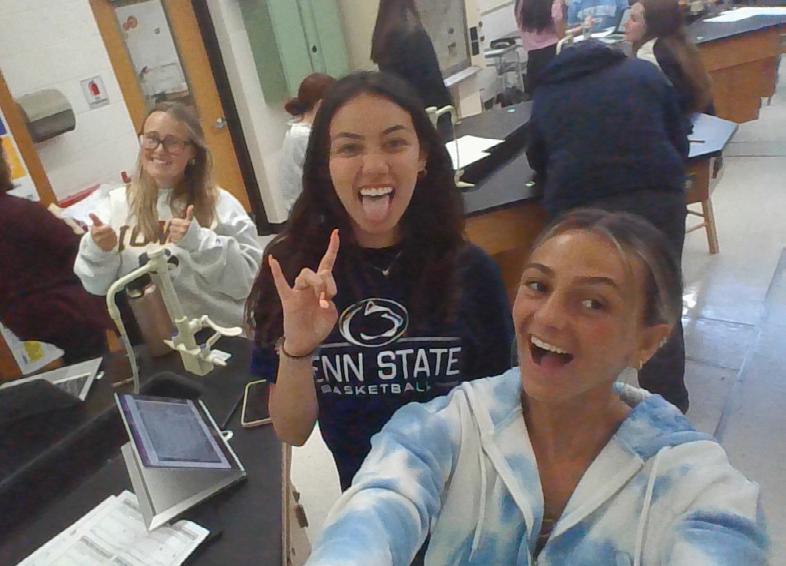 by Irene Cho, Jiwon Jeong, Seowon Jeong
by Irene Cho, Jiwon Jeong, Seowon Jeong
email chain polite and school appropriate without leaving out the fun. After three strikes, viola -offenders are kicked out of the chain.
Sean says he doesn’t mind future senior classes making their own selfie chains, but he strongly encourages them to create something new and creative so that it’s more fun.
Anonymous: “I have been asked to participate in the chain since the beginning. I think it’s kind of corny but to each their own. Also, I would get overwhelmed and possibly annoyed by the amount of selfies I’d receive.”
Sarah Weitzenfeld: “I mean it is cool that a class this size can come together and send fun stuff to each other, but I do not really participate much; not really for me.”
Ethan Suede: “I like to see what everyone is doing throughout the school day.”
Maeve Flynn: “I think it’s a cute wholesome way for our grade to come together with positivity. #rollhawks #hawkpride”
David Arturi: “The selfie chain has helped the senior class grow just a little bit closer.”

The school year is almost over, and the class of 2023 are graduating from River Dell High School. Amidst these melancholy times, a senior, Sean S. Kim, started something new and unexpected to spice up his last year here: a strictly senioronly selfie chain on email. As reporters, we saw the smiling faces of all the seniors in each photo and wanted to know how it started!
In an interview with Sean, we asked questions about the origins of this creative idea. It all started one day in English class when Sean “took a picture of myself during English class because I was bored, and it turned out really funny, so I sent it to my friend. After that, I just sent it every day, and he replied with a selfie of his own. The next day he added another kid and then the next day, another kid was added.” Not too long
after, the email chain snowballed and included almost all the seniors. Sean made some rules to ensure the email chain maintained its order. Sean explains, “Some of the rules are that I have to start it, so I have to send my own selfie first, and then everyone else can add onto it. You can send one selfie by
Mr. Pepe was interviewed on his opinion of the chain, and he responded that while he appreciates the idea of the senior selfie chain, he would like to remind students that they must use their school emails for school-related communication only. So, if you want to start an idea like this, please ensure it is appropriate and adheres to RDHS guidelines!
The class of 2023 was asked to share their opinions of the chain, and the results can be viewed below:
John Forte: “It’s cool to see something blossom from a few guys sending selfies as a joke to like 250 people every day.”
Mark Rittgers: “I think it’s a fun thing for seniors to do and allows us to have something that was student
Anna Sears: “I like that people feel comfortable interacting with those in the grade they might not have exposure to otherwise, I feel like it brings us closer together as a grade and helps solidify the experience of se-
yourself, but if you want to send a second you have to either add a new member or take a selfie with someone already on the chain, and obviously keep it PG, no inappropriate stuff.” All the students in this email chain try their best to keep the
Abigail Ra: “I love the selfie chain. I think it’s so fun how everyone in our grade comes together to post a selfie every day. I remember when I was first added to it on day 7 and there were only 6 other members. I think it’s a perfect way for everyone to get closer to each other before we graduate.”
As we approach the end of the school year, we often feel like moving on to bigger and better things in life. What better way to commemorate all of our high school experience than a coming-of-age playlist? Most songs featured should be listened to on an open road – with all your best friends, of course – so you can reflect on all the hard work, tough times, and happiness you and your peers have experienced throughout the course of high school.

1) “Where Is My Mind?”Pixies
2) “Rollercoaster”- Bleachers
3) “Tongue Tied”- GROUPLOVE
4) “Night Changes”- One Direction
5) “Tonight, Tonight & 1979”- The Smashing Pumpkins
6) “Never Grow Up”- Taylor Swift
7) “Ribs”- Lorde
8) “Where’d All the Time Go?”- Dr. Dog
9)”Slipping Through My Fingers”- ABBA (but also Mamma Mia)
10) “Scott Street”- Phoebe Bridgers
11) “This Town”- Niall Horan
12) “Pluto Projector”- Rex Orange County
13) “Cigarette Daydreams”Cage the Elephant
14) “Sunsetz”- CAS
15) “Somewhere Only We Know”- Keane
16) “Everybody Wants to Rule the World”- Tears for Fears
17) “Hackensack”- Fountains of Wayne
18) “Yellow”- Coldplay
19) “Heroes”-David Bowie
20) Chasing Cars-Snow Patrol
21) “Streetcar”-Daniel Caesar
created and only for us. It’s kinda like an exclusive club.”
Madelyn Fried: “The selfie chain is a nice break from school that allows seniors to tell each other what is happening in other classrooms.”
Bruno Angeli: “I think it’s a nice way of being social, even if I haven’t thought of joining in it yet.”
Anonymous: “The connectedness of everyone and making me feel a part of something as a grade.”
Kristian Bush: “I like that it creates a bond among the class as a whole; a place where everyone can share what they’re doing and exchange laughs every day.”
Miranda Peralta: “The email chain is fun to see what everyone is doing in their classes, but when you get a lot of those emails in one day, it can be too much.”
Mary Palazzo: “I love that the senior class is able to collaborate as one in a silly and harmless way, especially because after graduation, most of us will never interact again.”
Michael Panella: “My really good friend Sean Kim started it and he wanted everyone in the grade to be in it and I think it’s really nice that he wants the whole entire senior class to be a part of this fun and easy activity every day.”
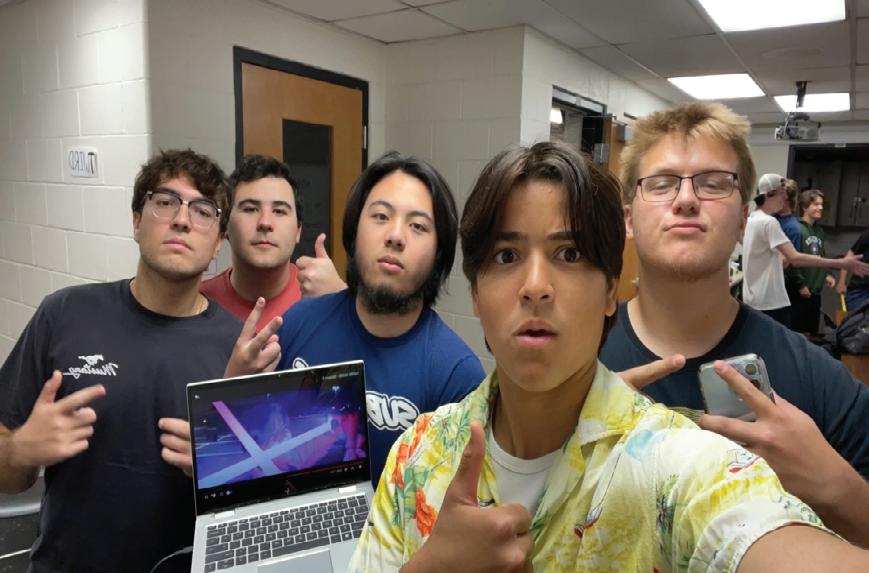
22) “See You Again”- Tyler, The Creator and Kali Uchis
23) “What Once Was”- Her’s
24) “Time”- Pink Floyd
25) “The Spins”- Mac Miller
26) “Ivy”- Frank Ocean
27)”Landslide”-Fleetwood Mac
Total Time: 1 hour 56 minutes